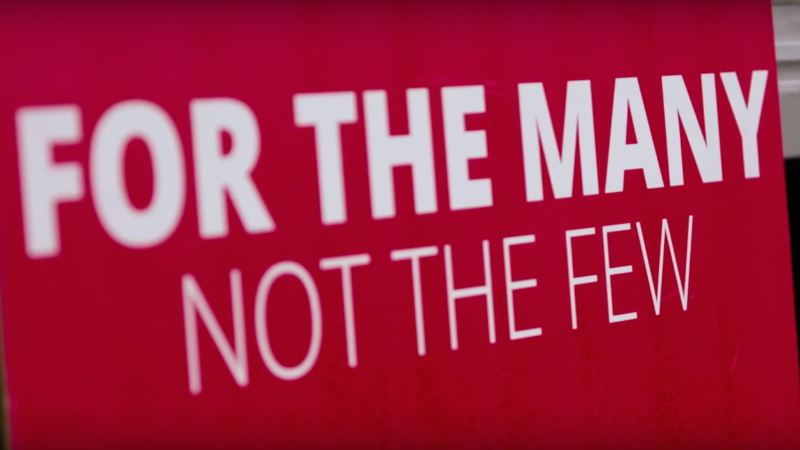
Jeremy Corbyn has written a Guardian piece in which he sets out Labour’s current Brexit position. In government, the party would secure a “sensible deal” from the EU, put it to a public vote against Remain and “carry out whatever the people decide”. The strap line? “Let’s stop a no-deal Brexit – and let the people decide.” Although there is no mention of Harold Wilson, the 1975 referendum or staying neutral, the article has been widely interpreted as signifying that Corbyn would not back either Remain or Leave in Labour’s public vote. Unlike the ‘Scenario 2’ trade union stance, though, the article doesn’t confirm that Labour’s position “should depend on the deal negotiated”. Instead, it simply leaves the question unanswered. The pressing issue: will Labour conference answer the question for him, and will it be the pro-neutrality unions or pro-Remain members who decide?
This Brexit-focussed headline news from Labour is actually not new – but there are plenty of genuinely surprising party developments thanks to yesterday’s meeting of the national executive committee (NEC). For a start, NEC members were told that trigger ballots will continue while all parliamentary selections have been paused. Yes, all of them, including those that were allowed to carry on last week, such as Ilford South, which has shortlisted. The ruling body will consider proposals for shorter selection processes at conference on Friday. That is when we’ll find out whether a truncated timetable means NEC shortlists then local hustings, the least democratic option of NEC impositions, or another route to getting candidates in place. Overstretched and pressed for time, rules may not be evenly applied: Corbyn requested that selections in retirement and defection seats (i.e. winnables) restart as soon as possible.
The other key outcome: the NEC has abolished Labour Students. Momentum’s Jon Lansman put forward a motion proposing that the Corbynsceptic-dominated organisation was not actually affiliated to the party and should be replaced by one that complies with rules – and it passed, with a two-thirds majority. The result caused huge uproar among ex-’NOLSies’, especially Labour MPs who cut their teeth in student politics. Was such an overhaul wise, coming just ahead of an election? But after trying unsuccessfully for years to reform and democratise the body, which didn’t implement one-member-one-vote this year and saw many clubs disaffiliate in outrage, many students were delighted.
The NEC also refused to approve a request by Welsh Labour to devolve reselections. They are already in charge of their own selections, and have secured candidates in 11 of 13 vacant seats, with the remaining two contests underway. In light of this efficiency, many Welsh Labour activists are disappointed by the decision, which they see as “a way to hoard power at the centre and attempt to control reselection centrally rather than an interest in party democracy” as one put it to LabourList. As this excellent thread outlines, it also risks harming relations between Corbyn and his supporter Mark Drakeford.
Another overlooked ruling: the approval of Corbyn’s proposal to fast-track the most serious cases of racism, misogyny, homophobia and transphobia. This will quicken the pace of handling complaints, which is a significant part of the problem, but critics say they don’t trust the leadership with antisemitism complaints and this reform will give Corbyn allies more power over the process. Under the new system, the general secretary and NEC officers would be able to expel members without referring their cases upwards to the national constitutional committee (NCC).
These conclusions give party members a lot to chew over. The difficulty running through all of the various arguments over these reforms, or lack of reforms, is that trust between different wings of the party is at rock bottom. Corbynsceptics often won’t admit that Labour Students is deeply flawed because they fear that whatever replaces it will be just as bad, democratically speaking, but would instead favour their factional rivals. And that lack of trust isn’t going to change any time soon.
If you’re in Brighton on Monday, make sure you come to our panel event ‘Labour’s next manifesto: Bridging divides with radical policies’. One speaker, Lisa Nandy, has written a typically spot-on piece for LabourList today about the focus of the next manifesto ahead of conference. Check out the Facebook event and click ‘Going’.
Sign up to LabourList’s morning email for everything Labour, every weekday morning.



More from LabourList
Josh Simons resigns as Cabinet Office minister amid investigation
‘After years of cuts, Labour’s local government settlement begins to put things right’
‘The Sherriff of Wild Westminster: what must change in elections bill’